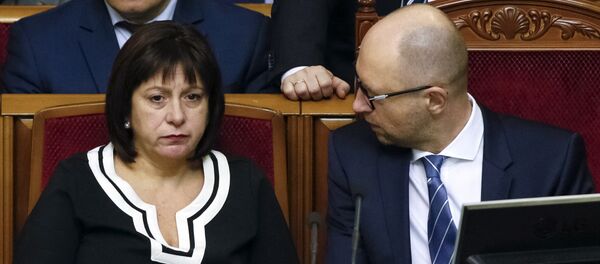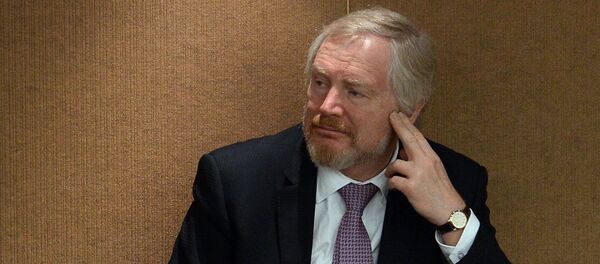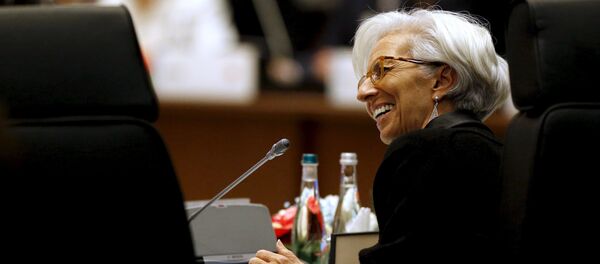On Tuesday, the International Monetary Fund board recognized Kiev's outstanding $3 billion debt to Moscow as sovereign, a status Kiev had fiercely contested. On Friday, Prime Minister Arseniy Yatsenyuk reiterated the Ukrainian Finance Ministry's announcement earlier in the week that Kiev would not repay the debt.
Despite the IMF's status as an institution managed and controlled by Europe and the United States, the bank nevertheless admitted that with "the Russian authorities [representing] this claim as sovereign, the information available regarding the history of the claim supports this representation."
For its part, Moscow, which made the loan to the previous Ukrainian government, since deposed in a coup d'état last year, made every effort to emphasize that the loan was provided by Russia's sovereign National Wealth Fund, leaving its status uncontested. Moreover, last month, Russia announced that it was willing to stretch the payment period over three years, pending guarantees from the US or the EU, a proposal which Kiev, Washington and Brussels ignored.
Now, the IMF decision means that Ukraine will have to pay Russia back by December 20. If it fails to do so, Moscow, within 10 days, will have the right to take Kiev to court. Russian authorities have already informed their Ukrainian counterparts of their intention to do so.
Three days from now, absent a sudden shift in policy, Kiev will default on the loan, effectively admitting its inability to pay its debts and to meet its financial obligations to other countries in good faith.
According to Nikita Isaev, the Director of the Institute of Economics, had the IMF chosen not to recognize Kiev's debt to Moscow as sovereign debt, the decision would have had catastrophic consequences for the global sovereign debt market.
"It's obvious that the IMF could not have made such an insane decision; they were forced to state the obvious," Isaev noted, interviewed by independent Russian newspaper Svobodnaya Pressa. "The suggestion that the debt was commercial was Kiev's biggest trump card, and I really don't know now how the Ukrainian side could possibly line up its defense against a Russian lawsuit now."
Isaev noted that "in the interests of gaining a stronger position, Kiev would be better off acknowledging its obligations before our country, instead of engaging in populism – because such behavior actually undermines the IMF itself, as well as Ukraine's American and European guarantors."
Confident that Russia will win the case in court, if it comes down to that, Isaev suggested that a court decision in favor of Ukraine would mark "a flagrant violation of the international rules on loan markets," one which could result in a dramatic "domino effect" on the international sovereign debt market. "For example, in such a situation, the United States could say that they too could not pay its $18 trillion in sovereign debt."
"Ukraine," Isaev emphasized, "is haggling over what sovereignty it has remaining. Poroshenko said recently that the central banks of Ukraine and Poland have agreed on a one billion euro credit line; I'm not sure if this is true or not. In any case, the IMF is not a charity. Ukraine is preparing the privatization of whatever valuable state property remains. To get out of debt, Kiev will be forced to trade in its national interest."
For his part, Alexei Panin, the Deputy General Director of the Center for Political Information, suggested that he wouldn't be surprised if Ukraine was able to find the money at the last minute.
"This is one option. The current Ukrainian leadership is copying, more and more, the decision-making model in the United States; we can recall that the Congress of this country has just agreed to raise the debt ceiling, minutes before the deadline."
"As far as Ukraine's default is concerned (if it occurs), it would serve as a black mark for international investors and creditors. Obviously, the sovereign credit rating of the country in such a case would not allow it to obtain any more loans, except on onerous terms, and under sky-high interest rates. Ukraine's economy is already in a terrible state. Factually, [the default] would threaten to put Ukraine into a pit out of which it would be nearly impossible to climb out of."
Ultimately, Panin suggests that if Russia takes Ukraine to court, Moscow will win, even if it takes years. Otherwise, "the entire model of global lending will collapse, and no one be willing to allow this to happen for Ukraine's sake. No one is going to jeopardize the trillions of dollars flowing around the world for Kiev."
For Ukraine, "Russian credit was the most lenient in its conditions. If Kiev refuses them, it will enter into the field of impartial and uncompromising international agreements, made according to conditions set by others."
"Ukraine," Panin concludes, "had hoped that agreement with the West would be easier to come by than with Russia. They miscalculated. Already hooked on the 'debt needle', a default would result in the collapse of its sovereign debt rating, and there would be nowhere left to turn for help, apart from the World Bank and the IMF, which dictate their own terms. They have already set the terms for the sale of Ukraine's rich chernozem soil; a program is being prepared for the mass privatization of the remaining profitable state assets. For the population, a default will mean the collapse of the hryvnia, and a sharp decline in living standards."





